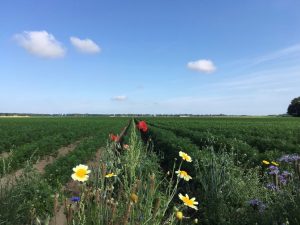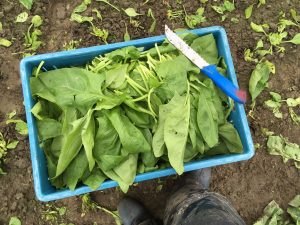by Rosa de Nooijer

Image 1 – Quince by Paul de Nooijer
My ways of eating have become fundamental to the way I want to be in the world. Food has always played an important role in my life, as we need food to stay alive, but it also connects us to those around us, whether that is when we are growing food, eating food or when we are caring for the earth and the other-than-humans on and in it. However, over the past years, I have come to understand that much of the food we buy and eat is produced in agricultural landscapes that are highly industrialized and mechanized. Not just that, but the bigger food systems, of which the growing of crops is only a small part, are de-humanizing and exploiting workers all over the world to ‘please the needs of consumers’ and destroying bio-cultural diversities to sustain capitalism and other oppressive systems. Also, the inequalities that are reproduced in these food systems result in the majority of the world population relying on cheap and unhealthy food, which increases their risks to a variety of diseases, one of which is COVID-19 which has been linked to different food-related diseases, for example diabetes, obesity and malnourishment.
These realizations are at the foundation of my personal, political and academic involvement, where food and eating are the lenses that help me to look critically at my own context and the ways in which I eat. Doing this, it is my goal to challenge the academic discourse around food and eating, the way in which they are researched, as well as changing our eating and growing practices.
In my master’s thesis, I used a feminist approach to research relationality in the Netherlands, specifically in the farming and eating practices of organic and biodynamic farmers. I asked how these farmers are challenging the binaries that are inherent to anthropocentric ways of understanding the world and disembodied ways of being in it. More so, I analyzed the role of food in their lives and how binary understandings of humans and nature could be rethought and reshaped, making way for an exploration of the interconnectedness between humans and other-than-humans.
Being born and raised in a country that is one of the biggest polluters in the world and responsible for a lot of the exploitation and destruction in and around food production, it was a conscious choice to stay here for my research. This allowed me to learn about the food systems in the Netherlands and how they contribute to social oppression and ecological destruction. Moreover, it taught me about the resistance against mainstream agriculture, about caring for the earth, and about rebuilding complex and diverse socio-ecological systems.
To contextualize, it is important to point out that the farmers I worked with were located in Flevoland, which is a province in The Netherlands that was reclaimed from the sea between 1930 and 1968 (de Nooijer; 8). The farmers I worked with were white and had access to land, whether that was because they were leasing land or because the land was already in their family since the region had been drained. They were able to use machines for working the land, and they had enough financial security to hire seasonal workers if necessary.
At the same time, it was also clear that their way of farming and being with the land were outside the mainstream and that they were actively resisting the disruptive and exploitative characteristics of farming, both socially and environmentally. They understood their farms as holistic spaces where many species met and interacted daily. It was also clear that they were putting effort in challenging the power-structures that can be found in farming practices by building close relationships with the people they worked with, whether that was during work or by having communal dinners with food grown at the farm.
Researching these topics, it was also my goal to experiment with different ways of writing about food, working the land and being close to the soil. One of the ways in which I tried to capture lived experiences related to food and eating, was by working the land alongside the farmers, using storytelling and creative writing in my work, so that the reader could visualize my research process.
To give you an idea of what this looked like, the following section is an excerpt from my thesis:
The Dinner of Relations
“It is the end of a hot summer day when you are on your way to the dinner of relations. You decided to walk there, because the days are long, and you want to enjoy the sun as much as possible. When you arrive to the place, you open the door and enter, after which you see a room with a big table that is beautifully decorated with a colorful tablecloth. The right side of the room has an open kitchen where people are talking to each other, occasionally making a joke and laughing, as they are preparing different dishes. You walk towards the table and take a seat, after which a small note in front of you catches your attention. It says:
Welcome to the Dinner of Relations.
You, among many others, have been invited to come to this special place to partake in a new dining experience. This room will help you to stimulate all your senses. We are asking you to look around you to see who else is sharing this space with you, but we also want you to listen, smell, taste, feel and sense what is happening. Time, as you know it, will not be relevant as long as you are here, as the space is in relation with the seasons and ecological cycles. Please relax and pay close attention to everything that is happening around you, it is all part of the experience.
Eetsmakelijk!
When you finish reading, you close your eyes and inhale deeply, you smell fresh garlic and onion, and then the sweet smell of wildflowers and freshly mowed grass enters your nostrils. You feel heat on your face, so you open your eyes and see the sun shining through leaves above your head. A breeze makes the leaves move, and you hear a bird. Looking around the room you see that it is filled with flowers with insects buzzing around them. In the distance, a potato field stretches out, and it looks like someone is working the land. Next to the potato field you see a forest with a pond where cows are gathering to drink and enjoy the afternoon sun. The flatness of your surroundings and the stacked clouds in the distance make it look like the fields are never-ending, which is a feeling that you get more often when looking at the Dutch landscape.
A world is unfolding in front of your eyes, and you realize that the table is no longer empty. Other guests have arrived, and a chatter is filling the room, blending in with the other sounds” (De Nooijer 2019: 6).

Image 2 – Flowers and Carrots by Rosa de Nooijer
Today, when I look back at my experiences at the farms and the writing process after and even the sensations and emotions I chose to privilege, I realize that the different guests at the Dinner of Relations taught me that to eat well, is much more complicated than just looking at the nutrition that is in our food. It is a political choice and a way of challenging the global hegemonic food systems while being implicated in them. These food systems are relying on the cheap labor of, often migrant, workers whose working conditions are unhealthy, unethical and exploitative. They are also relying on chemicals that are sprayed onto crops to prevent pests. These chemicals are polluting the soil and the water, which are essential to guarantee the equilibrium of the Earth’s ecosystems. They also compromise the health of those who are breathing them as they work the land. This results in increased vulnerability and it deepens inequalities, as breathing clean air becomes something that only the rich can afford.
If we connect eating as a political choice to the breath and breathing, it is evident that the inequalities found in the food systems can be linked directly to them. The pesticides, herbicides and other chemicals that are commonly used in the food system are taking away peoples’ breath, not only from their lungs but also because food systems are based on and dependent on discrimination and exploitation. Understanding eating as a political act to challenge power-structures and oppressions makes it unavoidable to address breathing as well, simply because the breath of many is influenced by the growing, processing, distributing and selling of food. Both eating, and breathing, therefore, as Icaza and Sheik emphasize, can be radical acts of resistance during the COVID-19 pandemic.
However, it is not just those who are working in the hegemonic food system whose health is compromised. Those able to consume are also affected, as they are buying in stores and made dependent on cheap food that is full of sugar and saturated fat. Only a small minority in the world has the financial resources to buy expensive organically grown products. The majority of the world population cannot afford these products and the result of this is that many people are eating food that is harming their health. Two extremes are created, on the one hand we see high numbers of people who are malnourished while others live with obesity. Both make people more vulnerable for many diseases, including COVID-19 which is more prevalent in people who suffer malnourishment or who are diabetic, obese and live with hypertension, all of which can be related to our diet.
It is essential to expand conversations about food, especially now that we are in the middle of a global pandemic. Looking back at the Dinner of Relations, I realize that the table we eat at has to be bigger, the guests diverse and that the critical and reflexive conversations have to continue. With this I mean that it cannot just be academics who sit at this table, and it can especially not just be white Europeans who set the table, who do all the talking and who set the terms of the conversation. We need to listen to the experts, the ones who know the soil and the seasons. We need to be silent and listen to the experiences of people who have been and are facing structural inequalities such as racism and classism for centuries already. It is time for those who have been dining at the tables of similar dinners, to hold themselves and each other accountable for their behavior, acknowledging that it is time for a new conversation lead by the voices who have historically been silenced and/or erased.
It is because of The Dinner of Relations that today, food and eating are fundamental to the way I look at life, relationships and how I understand resistance, regeneration, relationality and communality. Both have led me to learn about the soil, the seasons and the need to take a step back and listen to the rain, the wind and to what crops are asking from us. Eating has become an essential element to achieve an ethical life, especially in times of a pandemic that has highlighted structural inequalities which are disproportionality affecting racialized, marginalized and impoverished communities all over the world. I believe that COVID-19 can work like a magnifying glass that shows these structural inequalities to those who have benefited from them.
To eat well means that we need to look further than the vegetables we buy in the supermarket. If we do not know where to start challenging how we eat and grow food, we need to question our role in the systems we are a part of and evaluate why we are detached from the different lives (human and other-than-human) and ecological processes that are at the root of our food systems. It is important to ask where the food we eat comes from, who cared for the soil while growing it, and which hands prepared it, wondering whether we know which vegetables are growing in which season. It is also necessary to think about whether the price we pay for food reflects the labor that went into it, what the working conditions of those who grew, processed and distributed the food were like, and why it is that some food is exclusively for the white middle- and upper-class who can afford ecologically produced food. Most importantly is to connect within and beyond our communities, to grow our own food, harvest and cook it together. While eating together we need to be ready to listen to what the others at the table have to say, which is only possible if the terms of the conversations are changed; something that we, the privileged ones, are not familiar with.

In summary, we need to start talking about eating, not just about food, we need to problematize who gets to eat and who gets to eat well, and finally we ought to reflect on which inequalities are reproduced in food production and consumption every single day.
Image 3 – Spinach Harvest by Rosa de Nooijer
My name is Rosa de Nooijer and I am Dutch and Greek, born and raised in the Netherlands. I hold a master’s degree from the International Institute of Social Studies, Erasmus University Rotterdam. As a feminist, I want to build strong communities and movements with those around me, that are prioritizing women’s voices and our relationships with each other. I am an environmentalist, caring deeply about the earth, the soil and all living beings on and in it. Most of the work I do is related to food politics and agrarian studies, gender and climate change, usually linking these topics to one another because to me they are all interconnected.
